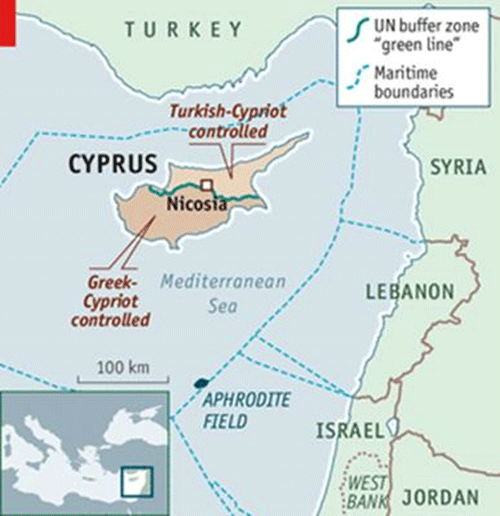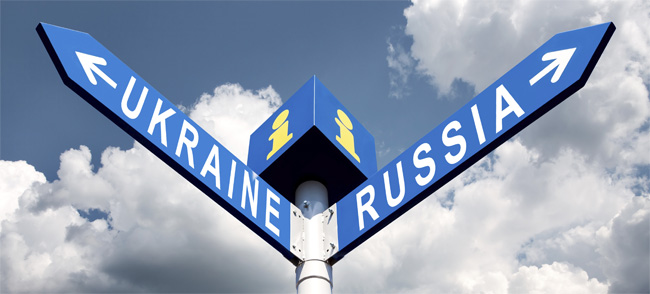The annexation of the Crimea has led the European Union to begin to consider weaning itself off its heavy dependence on Russia for energy supplies, particularly gas. There is an alternative in the Eastern Mediterranean, which might also help resolve another thorny issue – the reunification of Cyprus, divided since Turkey’s invasion of the island in 1974 into a Greek-Cypriot south and a Turkish-Cypriot north.
Noble Energy of Texas announced a major discovery at the end of 2011 in the exclusive economic zone of the Republic of Cyprus, an EU member since 2004 (the acquis communautaire only apply to the Greek Cypriot part). Turkey disputes the right of the internationally recognized Cypriot government (unlike the pariah Turkish Republic of Northern Cyprus) to exploit the energy wealth, and has used gunboat diplomacy (to no effect).
Moreover, the Aphrodite natural gas field, with an estimated 4.2 trillion cubic feet, is close to Israel’s even bigger Leviathan gas field – the very name suggests how much energy it might contain. According to the United States Geological Survey, an estimated 122 trillion cubic feet of recoverable natural gas and 1.7 billion barrels of recoverable oil lie beneath the seabed of the Levant Basin, about as much as the world consumes in a year.

Energy-hungry Turkey (population 74 million) is the logical place to receive the oil and gas from this area as it has no energy of its own to speak of and is already shaping up to be a transit point for the wider European energy market. But current pipeline plans from the Leviathan field to Turkey would have to cross over Cypriot territory in order to avoid the trouble spots of Syria and Lebanon.
There is no way that Cyprus would allow this unless there was a definitive solution to the island’s reunification. A majority of Greek Cypriots rejected the plan put forward by Kofi Annan, the former secretary general of the United Nations, in 2004 to unify the island, while most Turkish Cypriots voted in favour. Since then there has been no progress on one of the world’s most intractable international problems.
The option of building a $10 billion liquefied natural gas plant at Vassilikos – much more expensive than a $3 billion pipeline to Turkey – does not seem viable. Cyprus needs to find more gas to justify the plant.
The Cypriot and Israeli governments have an agreement delimiting the maritime boundary between the two countries, as well as defence and cooperation agreements. These accords came after Turkey’s relations with Israel reached a low point in May 2010, following the Israeli raid on a Turkish-flagged aid flotilla seeking to break the Gaza blockade, in which nine Turks died. Last year, Turkey and Israel began to patch up their relations.
For Turkey an energy deal would serve as a channel to normalize bilateral relations with Israel, while mending fences with Cyprus over reunification of the island would enhance Ankara’s sputtering bid to become a full member of the EU as it would lead Nicosia to remove its veto on opening various chapters (policy areas) in Turkey’s EU negotiation process. For Cyprus, reunification would, in the long-term, aid a crippled economy that received a €10 billion bail out last year, following the near collapse of the banking sector.
The main stumbling block is the Greek Cypriot resistance to reaching an agreement on reunification that does not meet all its demands.
Nicos Anastasiades, the president of Cyprus since 2013, was the only prominent politician to vote in favour of the 2004 plan when he was head of the conservative Democratic Rally party. Last February, Anastasiades met his Turkish Cypriot counterpart Dervis Eroglu for the first talks on reunification in 18 months. Both claimed they wanted to end the island’s division ‘as soon as possible.’ According to Lisa Buttenheim, the resident UN envoy on the island: ‘The leaders expressed their determination to resume structured negotiations in a results-oriented manner’. A second meeting was scheduled for 31 March.
Alexander Downer, the UN’s special adviser to Cyprus since 2008, resigned in February. UN Secretary-General Ban Ki-moon has asked him whether he feels it would be useful to appoint someone to replace him or whether his duties can be fully undertaken by Buttenheim. Although he left empty-handed, now would not seem to be time to relax the new momentum.
What is needed is a conciliatory gesture by the Greek or Turkish Cypriots to give the talks a real chance of success. Perhaps something will be inspired by Aphrodite, the goddess of love. One such initiative would be a decision by Cyprus to remove its veto on opening the energy chapter on Turkey’s accession to the EU. The Greek Cypriot administration is the only EU member blocking this chapter.



